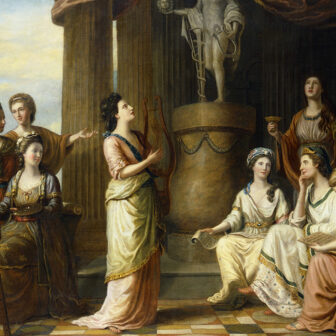IN APRIL 2007, at the age of seventy-seven, renowned British political scientist and Orwell biographer Bernard Crick made his first trip to Australia. Crick, the principal architect of Britain’s relatively new citizenship test, had been invited to Sydney to speak about citizenship and democracy. He arrived just as Australians were speculating about the form and content of our own new citizenship test, promised but not yet delivered by John Howard’s government.
Crick knew a thing or two about the battles ahead. Having been put through the grinder over his role in writing the heavily criticised test booklet, Life in the United Kingdom: A Journey to Citizenship, he seemed glad to have put the experience behind him. It wasn’t that Crick was unused to criticism. In fact, he’d never been afraid to stick his head above a parapet. But this time he’d made mistakes – “historical howlers,” in the words of the Guardian – that should never have appeared in such a document.
Cited as perhaps the booklet’s gravest mistake was its mangling of one of Winston Churchill’s most celebrated wartime quotes. It also claimed that Charles II was recalled from exile in France (it was Holland) and that Great Britain includes Northern Ireland (it doesn’t, though the United Kingdom does). Crick’s first, somewhat feeble, response was to say that the errors resulted from the pressure he was under to work quickly.
The need for speed didn’t quite fit as a defence of the booklet’s scope, however. The question of what to include in this kind of document, and indeed what not to include, will always be highly charged, as Australians soon learnt when the Howard government released its own citizenship test booklet, Becoming an Australian Citizen. While the more robust exchanges tend to centre on the folly of potting a nation’s “official” history in a booklet for newcomers, discussions about the type of knowledge necessary for citizenship can also get hot.
One of the more combustible entries in Crick’s booklet appeared in chapter five, “Everyday Needs”:
Public houses or pubs, as they are known, are an important part of local life in many parts of Britain. Groups of friends usually buy “rounds” of drinks, where the person whose turn it is will buy drinks for all the members of the group. It is sometimes difficult to get served when pubs are busy: people do not queue, but the bar staff will usually try and serve those who have been waiting longest at the bar first. If you spill a stranger’s drink by accident, it is good manners (and prudent) to offer to buy another.
Life in the United Kingdom, indeed.
While not all the information was test-able, critics generally agreed that the booklet included too much of the minutiae of everyday life: information about recycling household waste, the film classification system, paying bills at the post office, where to get a phone-card, and pet care. Dog owners could read about their responsibility to make sure that their dog “does not foul a footpath”; those inclined to prenuptial cold feet were informed that breaking off an engagement carried no legal responsibility to return the ring.
Crick was unapologetic. Never a great believer in flag-waving as a cure-all for social cohesion, he had designed the booklet with migrant integration and civic participation in mind. Both he and his patron, Labour home secretary David Blunkett, were determined to pursue a model of “active” citizenship. In this light, Life in the United Kingdom was first and foremost a “compendium of information,” a learning tool replete with practical knowledge and tips for, well, life in the United Kingdom.
By the time Crick arrived in Australia in 2007 his booklet had been overhauled. The historical inaccuracies were gone, as was the advice on bar etiquette. Gone, too, was Crick’s introductory welcome, which explained that integration was not about total assimilation and somewhat recklessly promoted the idea that “Britain needs immigrants.” In the revised version, the welcome was harder to find and more restrained: “The government welcomes new migrants to Britain. We very much hope that those who meet our residence requirements and decide to spend their lives in this country will seek permanent settlement and eventually go on to become British citizens.”
The two editions also looked very different. Adding weight to Crick’s assertion that it had been hastily put together, the original booklet looked more like a ministerial briefing than a statement of Britain’s nationhood. The glossier second edition, on the other hand, included full-page photographs of British icons – the Dover cliffs, Downing Street and St Paul’s – along with many smaller shots, some of them historical, some contemporary, some mundane.
Crick’s overall vision remained, however. If anything, the new edition was even more about life in the United Kingdom than its predecessor had been – often, soberly so. Readers learned, for example, that “there are many stories in newspapers about child molestation by strangers”; at the back of the booklet, a new thirty-page glossary included definitions of adultery, betting shops, cannabis, “condemn to death” (“this does not happen in the UK”), contraception, ecstasy (an “illegal and dangerous” drug that “makes users feel that they have lots of energy”), inappropriate touching, pogroms, rape, slavery and torture.
In what some commentators saw as a shift from welcoming immigrants to insisting that they toe the British line, the new booklet wasn’t afraid to moralise either: good citizens respect the law, the environment and other people; they raise their children properly, behave morally and ethically, work to provide for themselves, treat all races equally, help others, and vote. They also support their community by serving on juries, helping out at schools, joining political parties and volunteering.
IN LATE January this year, the British government released the third edition of Life in the United Kingdom. Not surprisingly, the new Conservative–Liberal Democrat government had made changes to the test they inherited from Labour. In a speech in October 2011, David Cameron had lamented that while prospective Britons were expected to know about the roles and powers of Europe’s main institutions as well as about the welfare system, “incredibly” they were not questioned on British history in the test. Taking cues from John Howard’s test, citizenship for aspiring Britons became a matter of values, responsibilities and historical knowledge.
The arguments against demanding tests of knowledge for citizenship have been well-aired. Chief among them, perhaps, is the peculiar expectation that migrants should acquire knowledge that the majority of the locally born don’t have. Cameron himself was caught out in an interview with American talk-show host David Letterman in September 2012, when he couldn’t name the author of “Rule Britannia” or give the English translation for Magna Carta. While the international press gorged on the irony, not everyone was convinced that Cameron’s blunder was genuine. Typical of the politics inherent in such matters, Boris Johnson saw it as a “brilliant move” by Cameron, designed to portray an everyman quality and avoid the impression that he had “Latin bursting out of every orifice.”
Cameron had ridden to America on a wave of post-Olympic British pride – and judging by the tone and appearance of the new booklet, his government is keen to ride the wave all the way to the beach. Certainly, the Union Jack, which hadn’t appeared anywhere in either of the first two editions of Life in the United Kingdom, is a recurring motif in the third. This is not particularly surprising. As far as flag-waving opportunities go, the Brits have been in rare form, with Will and Kate’s wedding in 2011, the Queen’s diamond jubilee in 2012 and a successful Olympics not long after. Britain has been rebranded, it seems.
When Cameron promised in 2011 to put British culture and history at the heart of the test, he meant it. At 182 pages, the latest version of the guide is weightier than its predecessors and, with all the information in the booklet fair game in the test, the British government is making citizenship a tougher goal than it has ever been. The history section, for instance, titled “A Long and Illustrious History,” is certainly long, beginning in the Stone Age and ending with the Conservative–
Liberal Democrat election win in 2010. Along the way it lists the six wives of Henry VIII, quotes lines from Shakespeare, pays tribute to the owner of Britain’s first curry house, and describes a number of “wonderful” British inventions. By comparison, the entire testable section of Australia’s post-Howard citizenship booklet, Our Common Bond – which includes the rights and responsibilities of citizenship, and details of laws and government, but excludes Australian history – amounts to only twenty-five pages.
The culture section in the latest Life in the United Kingdom is equally comprehensive. Again, the British seem to have taken their cue from John Howard by including lists of past and present luminaries in sports and the arts. Oddly enough, tennis player Andy Murray has more space in the booklet than the Beatles and the Rolling Stones combined. It is quite a feat for the Glaswegian, who, when asked whom he was supporting in the 2006 World Cup, replied, “Anyone who England are playing.”
The sports section also contains a passage about cricket in which readers are warned that they may come across expressions such as “batting on a sticky wicket,” “playing a straight bat,” and “bowled a googly,” which have “passed into everyday usage.” Frighteningly for both English and non-English speakers, not only must expressions that have recently entered the lexicon be learned, but also some that left it long ago. Among the excerpts from Browning, Byron, Wordsworth and Owen in a section on British poets are these few lines from Blake:
Tyger! Tyger! Burning bright
In the forests of the night,
What immortal hand or eye
Could frame thy fearful symmetry?
The UK Border Agency website says that the first tests based on the new booklet will not take place until 25 March, “to allow candidates time to prepare.” Judging by the amount of information in the booklet and the thousands of facts that could conceivably be tested, they’ll need much longer than that.
Bernard Crick – an avowed opponent of nationalistic chest-beating who was more inclined to the notion that capable government and just social institutions were the soundest foundations for a cohesive society – didn’t live to see the third edition of Life in the United Kingdom. It’s probably just as well. •




